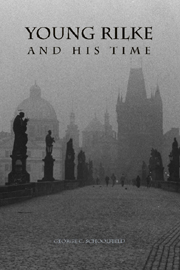Book contents
- Frontmatter
- Contents
- Preface
- Acknowledgments
- List of Abbreviations
- Chronology
- I Prague
- II Diaries
- III Rilke as Literary Critic
- IV Poems
- 8 “Der alte Invalid”
- 9 “Auswandrerschiff”
- 10 “An den Grafen von Platen”
- 11 “Die Liese wird heute just sechzehn Jahr”
- 12 “Venedig”
- 13 “Weißes Glück”
- 14 “Aus einem Bauernsommer” and “Vom Tode”
- 15 “Intérieur”
- 16 “In der Certosa”
- 17 “Die Heiligen Drei Könige”
- 18 “Aus dem hohen Jubelklanggedränge” and “Im Musiksaal”
- 19 “Karl der Zwölfte von Schweden reitet in der Ukraine”
- 20 “Sturm”
- Select Bibliography
- Index
18 - “Aus dem hohen Jubelklanggedränge” and “Im Musiksaal”
from IV - Poems
Published online by Cambridge University Press: 05 February 2013
- Frontmatter
- Contents
- Preface
- Acknowledgments
- List of Abbreviations
- Chronology
- I Prague
- II Diaries
- III Rilke as Literary Critic
- IV Poems
- 8 “Der alte Invalid”
- 9 “Auswandrerschiff”
- 10 “An den Grafen von Platen”
- 11 “Die Liese wird heute just sechzehn Jahr”
- 12 “Venedig”
- 13 “Weißes Glück”
- 14 “Aus einem Bauernsommer” and “Vom Tode”
- 15 “Intérieur”
- 16 “In der Certosa”
- 17 “Die Heiligen Drei Könige”
- 18 “Aus dem hohen Jubelklanggedränge” and “Im Musiksaal”
- 19 “Karl der Zwölfte von Schweden reitet in der Ukraine”
- 20 “Sturm”
- Select Bibliography
- Index
Summary
The last decades of the “long nineteenth century,” which ended in 1914, saw and heard a wonderful continuation of the German-Austrian musical flood, Brahms, Wagner, Bruckner, Richard Strauss, Gustav Mahler, and Hugo Wolf, accompanied by voices that had learned from the German tradition, such as Smetana, Dvořák, Grieg, and Sibelius. The response of major literary men in the same language realm was spotty: Thomas Mann was wholly at home in music and his works cannot be understood without a knowledge of the art; Hermann Hesse had deep and abiding musical interests; but Stefan George seems almost tone-deaf, and Hofmannsthal, during all the years of correspondence with Strauss, was very careful not to venture far into directly musical talk. It was his duty to occupy the “difficult and not thornless position as poet-librettist.” Rilke confessed to Prince Alexander von Thurn und Taxis (from Toledo in November 1912) that he regretted his “vollkommener Analphabetismus in der Musik” (GB 3:265; complete analphabetism in music). The previous February, to the “most learned maiden,” Ilse Sadée, he had dismissed Brahms' Alto Rhapsody, the setting of three strophes from Goethe's “Harzreise im Winter” (Harz Journey in Winter), while bubbling over with enthusiasm for the text: “nicht die Brahmsche (ich kenne fast keine Musik), aber das Goethesche Gedicht, die die pure Herrlichkeit ist” (GB 3:202; not the Brahms [I know almost no music], but the Goethe poem, which is pure splendor).
- Type
- Chapter
- Information
- Young Rilke and his Time , pp. 350 - 361Publisher: Boydell & BrewerPrint publication year: 2008



